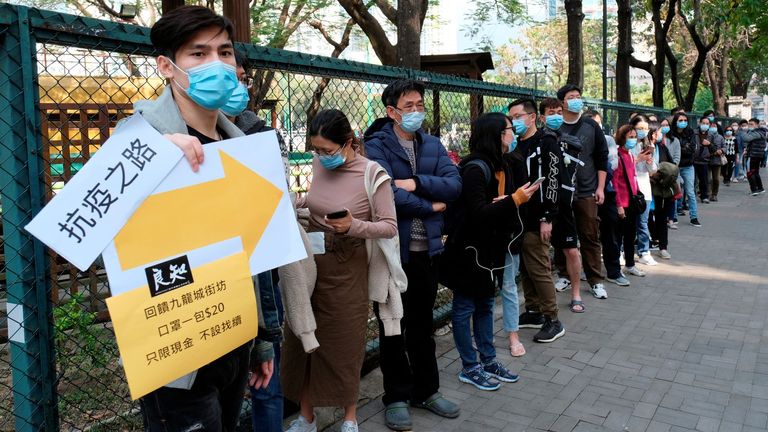Panic buying in Hong Kong amid 'alarming' spread of coronavirus
Sky's Alex Crawford reports from Hong Kong where there are fears political ties with China are being put above citizens' safety.
Monday 3 February 2020 08:31, UK
Almost everyone is wearing a surgical mask in the city now. Some have even resorted to donning respirator masks once used to counter the effects of police teargas.
Even Hong Kong's Chief Executive Carrie Lam wears a facial mask during her news conferences.
It's an astonishing turnaround given Ms Lam once attempted to ban the wearing of masks during the pro-democracy protests in the city because she viewed them as frustrating the identification of demonstrators.
But a city once wracked by weekly violent protests and firebombing is now facing another crisis - and this one could unite the most diverging political views.
The coronavirus outbreak is inside the city already, having spilled over from the many boundary crossings and transport links Hong Kong has with mainland China.
And the chief executive is once again being heavily criticised for not taking decisive action; not taking it quickly enough and being influenced by her political ties with Beijing rather than prioritising the health and safety of Hong Kongers.
"We just don't trust the government," one woman says. "And we don't trust the 'mainlanders'.
"We think they will escape any quarantine and go out in Hong Kong and just spread their virus."
And that is at the heart of it.
Eight months of fierce protests - which have seen demonstrators rampage through the heart of the city virtually every weekend vandalising government structures - has seen a dramatic erosion of trust and respect in the chief executive's ability to handle any crisis.
:: Listen to the Daily podcast on , , ,
The high-speed rail link with the mainland was shut down as was the ferry crossing - but only about a week after the entire city of Wuhan was quarantined by the Beijing government.
By that time, doctors in Hong Kong estimate about five million people had left the epicentre of the outbreak.
Professor David Hui, from the Chinese University of Hong Kong, says many of those people will have returned to cities and communities within the mainland - but many others will have travelled overseas too, or to Hong Kong.
Prof Hui is one of the foremost virus experts in the world and an adviser to the World Health Organisation, as well as one of four experts who advise Ms Lam.
He described the advance of the coronavirus as "alarming", especially as it was emerging that one in four cases are severe.
"The infection is still evolving," he said.
"We still haven't identified the source of it is extremely difficult to counter the spread until that is established."
He identified the city's first coronavirus sufferer who reported himself to hospital without any symptoms or fever.
He was sent home only to return two days later still feeling unwell, but still with no fever.
It was only an MRI which revealed small tuberculosis spots on his lung which led to him being admitted and testing positive for coronavirus.
There're also early suggestions that the virus can be passed from human to human and possibly linger active on hard surfaces such as door handles, escalators, desks and toilets.
If this is confirmed, it will make tracing any sufferers - and their routes - even more urgent.
A city which has lived through SARS in 2002-2003 (and which saw the highest number of deaths outside of mainland China), is on red alert - and this explains the panic buying of facemasks and hand sanitisers.
Almost everywhere is sold out in the city and any outlet which has the masks opens up huge long queues. Some people said they had lined up for six hours to buy a box.
"We have to," one woman says.
"We have lived through SARS. You have to do this. And Carrie Lam has to completely shut the borders with the mainland."
Hong Kong is particularly vulnerable to the virus because of the proximity and links to mainland China.
Mix this with its recent political history; its experience of SARS and its global reach as a major financial hub... and it becomes dangerously toxic.









